HOME > Publication & Reports > Annual Report 2016 > Hospital East
Department of Hepatobiliary and Pancreatic Surgery
Masaru Konishi, Shinichiro Takahashi, Naoto Gotohda, Motokazu Sugimoto, Nishida Yasunori, Yusuke Nakayama, Daigoro Takahashi
Introduction
The recent development of various diagnostic techniques has led to the detection of an increasing number of early-stage and borderline malignancies, and for such patients, a limited resection preserving organ function is indicated. However, some diseases, such as invasive ductal pancreatic cancer, advanced gallbladder cancer, and hilar cholangiocarcinoma, remain a difficult challenge for surgeons and are still associated with dismal long-term prognoses. Recently, chemotherapy for hepatobiliary and pancreatic malignancies have been developed. In line with this development, several studies on adjuvant chemotherapy for malignancies with dismal prognoses have also been conducted.
With the refinements in laparoscopic instruments and advances in surgical experience, laparoscopic surgery is a safe alternative for selected patients with hepatobiliary pancreatic neoplasms, and has fulfilled its indications. In our department, laparoscopic hepatectomy has been performed since 2002, and laparoscopic distal pancreatectomy has been performed since 2011.
Our team and what we do
Our group is composed of four attending surgeons, three chief residents, and five residents. The outpatient clinic is open five days a week. Staff meetings are held three times a week in which treatment strategies from the medical and surgical points of view are discussed. A case conference on imaging diagnosis is conducted every Tuesday in cooperation with radiologists and medical oncologists, and a pathology conference is held every month with pathologists. In 2016, 244 patients with hepatobiliary and pancreatic diseases underwent surgical treatment including 64 laparoscopic hepatectomies and nine laparoscopic distal pancreatectomies (Tables 1-3).
Table 1. Number of patients (2016)
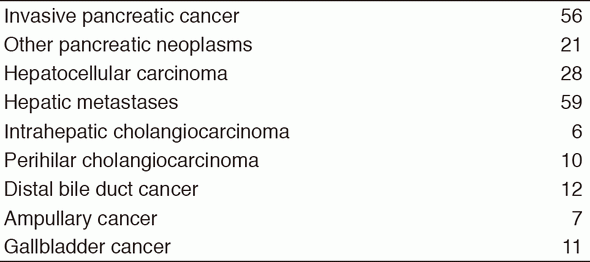
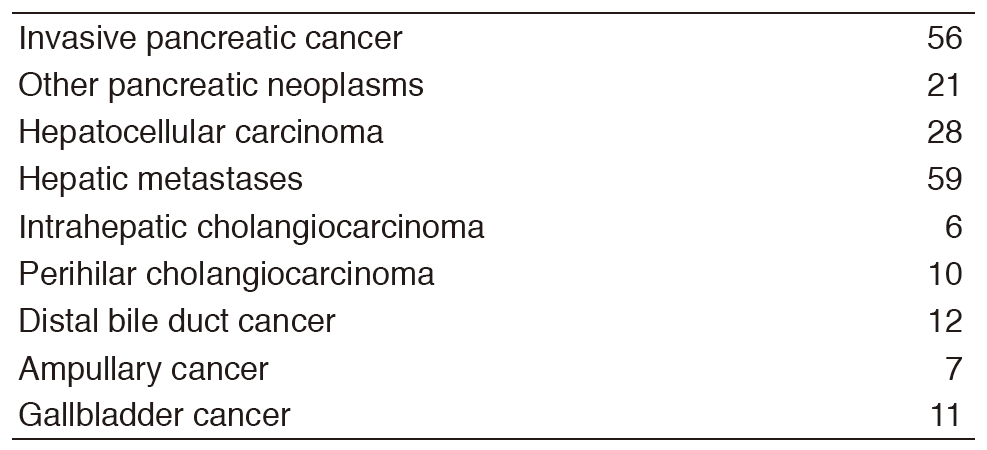
Table 2. Type of procedures (2016)
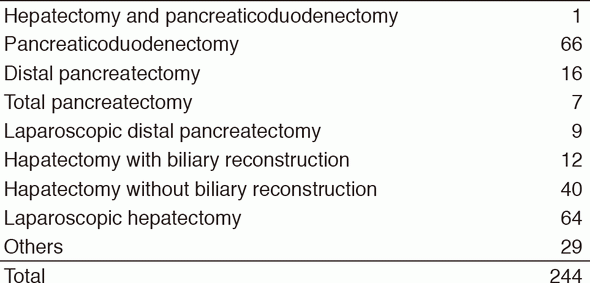
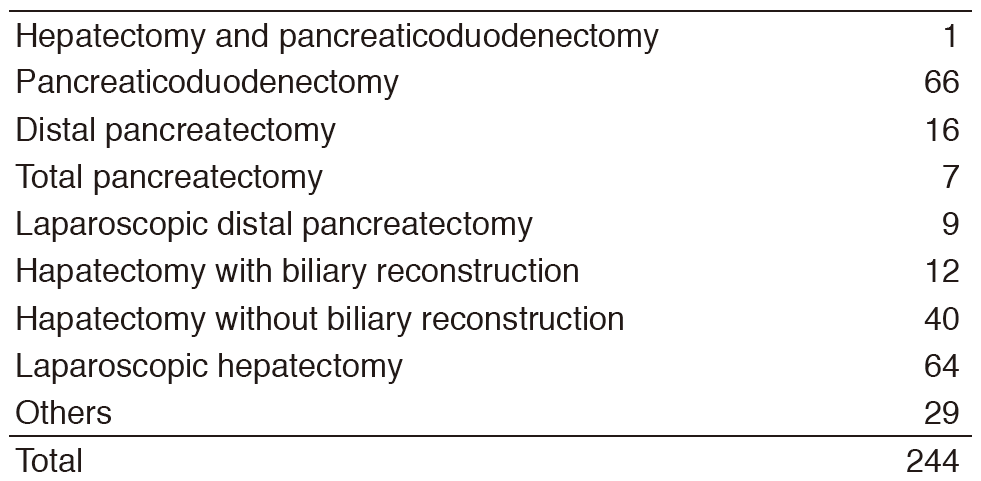
Table 3. Survival rates (2016)
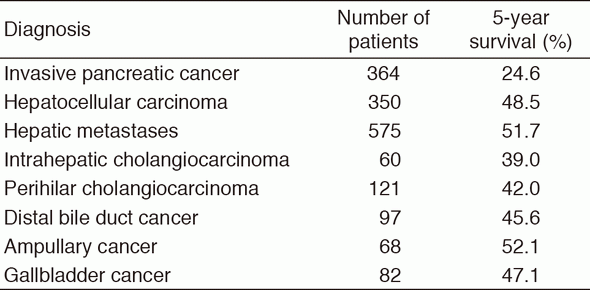
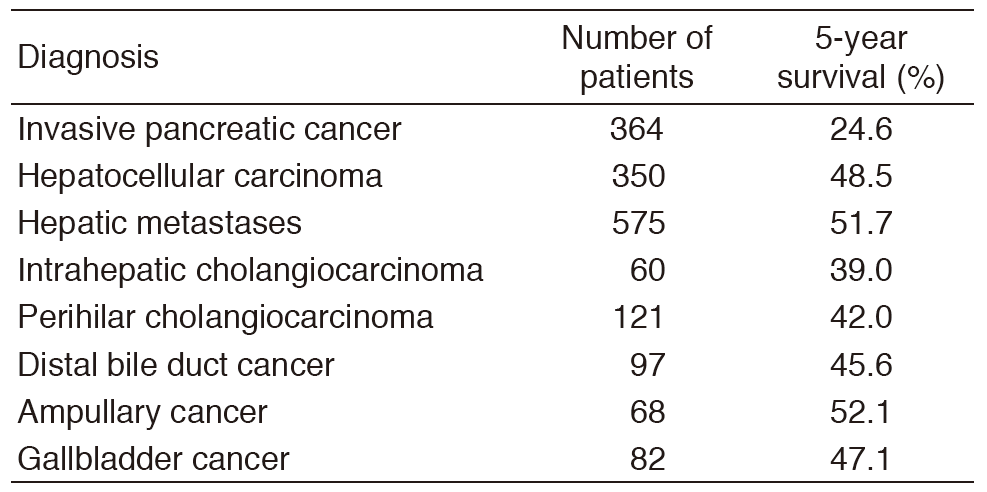
Research activities
1.Pancreas-sparing duodenectomy (PSD)
PSD represents an alternative procedure to pancreaticoduodenectomy (PD) for patients with duodenal neoplasms. The postoperative early and late complications of patients who underwent PSD were compared with those of patients with soft pancreatic parenchyma who underwent PD. The overall incidence of early and late complications was less in the PSD group than in the PD group. PSD is a less invasive procedure and has the advantage over PD of preservation of the pancreas.
2.Risk factor of postoperative pancreatic fistula (POPF)
To identify specific risks in a soft pancreas associated with POPF after PD, clinicopathologic parameters were analyzed and compared among patients with a hard pancreas, and those with a soft pancreas. A thick parenchyma, a small MPD, and fatty infiltration were strongly associated with clinically-relevant POPF after PD.
Clinical trials
- JASPAC04 is a randomized Phase II study on neoadjuvant chemotherapy using combination therapy with gemcitabine and S-1 vs. S-1 and concurrent radiotherapy in patients with resected pancreatic cancer. Recruitment started in 2014.
- JASPAC05 is a Phase II study on neoadjuvant S-1 and concurrent radiotherapy for patients with borderline resectable pancreatic cancer. Recruitment have been finished in June 2016.
- JCOG1202 (ASCOT) is a Phase III study to compare S-1 with surgery alone as adjuvant chemotherapy for patients with curatively resected biliary tract cancer including intrahepatic cholangiocarcinoma, extrahepatic bile duct cancer, gallbladder cancer, and ampullary cancer. Recruitment started in 2013.
- A phase I trial of ABI-007 and gemcitabine as adjuvant chemotherapy for patients with curatively resected pancreatic cancer is ongoing.
Education
The 'Board certified expert surgeons' is a high level of skill in the field of hepato-biliary-pancreatic surgery. To be qualified as a board certified surgeon, surgeons are required to perform a prescribed number of operations under the guidance of a board certified instructor. The residents of our department are being trained to get the certifications by the end of the chief resident course.
List of papers published in 2016
Journal
1.Takahashi S, Gotohda N, Kato Y, Konishi M. Measure of pancreas transection and postoperative pancreatic fistula. J Surg Res, 202:276-283, 2016
2.Nishida Y, Kato Y, Kudo M, Aizawa H, Okubo S, Takahashi D, Nakayama Y, Kitaguchi K, Gotohda N, Takahashi S, Konishi M. Preoperative Sarcopenia Strongly Influences the Risk of Postoperative Pancreatic Fistula Formation After Pancreaticoduodenectomy. J Gastrointest Surg, 20:1586-1594, 2016
3.Komai Y, Sugimoto M, Gotohda N, Matsubara N, Kobayashi T, Sakai Y, Shiga Y, Saito N. Patient-specific 3-dimensional Printed Kidney Designed for "4D" Surgical Navigation: A Novel Aid to Facilitate Minimally Invasive Off-clamp Partial Nephrectomy in Complex Tumor Cases. Urology, 91:226-233, 2016
4.Kato Y, Takahashi S, Gotohda N, Konishi M. The Likely Sites of Nodal Metastasis Differs According to the Tumor Extent in Distal Bile Duct Cancer. J Gastrointest Surg, 20:1618-1627, 2016
5.Kato Y, Takahashi S, Gotohda N, Konishi M. Prognostic Impact of the Initial Postoperative CA19-9 Level in Patients with Extrahepatic Bile Duct Cancer. J Gastrointest Surg, 20:1435-1443, 2016
6.Sawada Y, Yoshikawa T, Ofuji K, Yoshimura M, Tsuchiya N, Takahashi M, Nobuoka D, Gotohda N, Takahashi S, Kato Y, Konishi M, Kinoshita T, Ikeda M, Nakachi K, Yamazaki N, Mizuno S, Takayama T, Yamao K, Uesaka K, Furuse J, Endo I, Nakatsura T. Phase II study of the GPC3-derived peptide vaccine as an adjuvant therapy for hepatocellular carcinoma patients. Oncoimmunology, 5:e1129483, 2016
7.Uesaka K, Boku N, Fukutomi A, Okamura Y, Konishi M, Matsumoto I, Kaneoka Y, Shimizu Y, Nakamori S, Sakamoto H, Morinaga S, Kainuma O, Imai K, Sata N, Hishinuma S, Ojima H, Yamaguchi R, Hirano S, Sudo T, Ohashi Y. Adjuvant chemotherapy of S-1 versus gemcitabine for resected pancreatic cancer: a phase 3, open-label, randomised, non-inferiority trial (JASPAC 01). Lancet, 388:248-257, 2016
